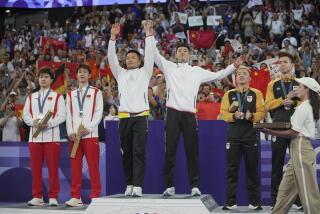L.A.’s Taiwanese Pray for Peace in Homeland
Jemeng Soh was 20 and a student at the National Taiwan University in 1979 when he heard the pulse-quickening news: The United States had decided to establish diplomatic relations with China and break all official ties to Taiwan.
People around him felt abandoned, terrified that the new allegiance would embolden China to become more aggressive toward the small island about 90 miles off its coast, said Soh, now the head of a software company and director of a community group called Taiwan in Torrance.
But there was a silver lining: The subsequent Taiwan Relations Act, passed by Congress 20 years ago Saturday, guaranteed that the U.S. would continue to provide Taiwan with enough arms to defend itself.
“It was like a security blanket, our insurance policy” against Chinese invasion, Soh said.
Over the weekend, the Taiwanese American community in the Southland--joined by Peng Ming-min, a former presidential candidate in Taiwan--rallied together to observe the 20th anniversary of this measure. Many have credited it with continuing to help protect the peace and prosperity of the island, where many Taiwanese Americans have family members or business relations.
“We hope God will get our message,” said Simon J. Lin, president of the Southern California Taiwan Center in Rosemead, moments before balloons bearing the words “Peace for Taiwan” were released.
“Taiwanese human rights must be respected and protected,” he said at the center, run by a coalition of 49 organizations. “The U.S. government should continue to support the people on Taiwan.”
Friday evening, about 25 people gathered for a vigil where they sat around hundreds of flickering tea candles arranged in the leaf shape of the island.
Wearing headbands emblazoned with “Peace for Taiwan,” they sang songs and talked about growing up fearful of the island’s government--until recent years a military autocracy--and being taught by their parents to not speak up. One by one, they also shared stories about their political awakening and involvement.
Lin, who demonstrated alongside Tibetan Americans and with other Taiwanese Americans against China’s Premier Zhu Rongji last week during Zhu’s Los Angeles visit, said to the group: “We must go out and fight to protect Taiwan’s democracy.”
On Saturday, about 500 people gathered at the Evangelical Formosan Church of Los Angeles in El Monte to hear keynote speaker Peng, a former chairman of the department of political science at the elite National Taiwan University.
“The Taiwan Relations Act has become the key component of Taiwan-U.S. relations and a major part of U.S.-China relations,” he said.
Peng called self-determination by the people on the island a “fundamental human right” that Taiwanese who now live elsewhere should fight to maintain.
Throughout the weekend, the participants--many of whom are immigrants--also spoke about the events leading up to the act and their pride at the island’s accomplishments despite its virtual political isolation by the international community.
After the Chinese civil war ended in 1949, the United States had been one of the staunchest allies of Taiwan’s Nationalist regime, maintaining a military presence on the island to protect it against the mainland’s Communist government, which considered the island a renegade province. In 1971, Taiwan--still known as the Republic of China--was ejected from the United Nations and the mainland People’s Republic of China took its seat. Nation after nation began severing diplomatic ties with the island in favor of Communist China.
Fears about Taiwan’s future prompted a wave of emigration to places like Southern California, now home to about 300,000 Taiwanese Americans, according to estimates by the Taipei Economic and Cultural Office in Los Angeles. But the Taiwan Relations Act helped maintain stability--a necessary foundation for the island’s economic growth and recent democratization, some noted.
With all the family and economic ties that now exist between the United States and Taiwan, Soh said, “in some ways, [the act] is even more important today than 20 years ago.”
More to Read
Sign up for Essential California
The most important California stories and recommendations in your inbox every morning.
You may occasionally receive promotional content from the Los Angeles Times.










